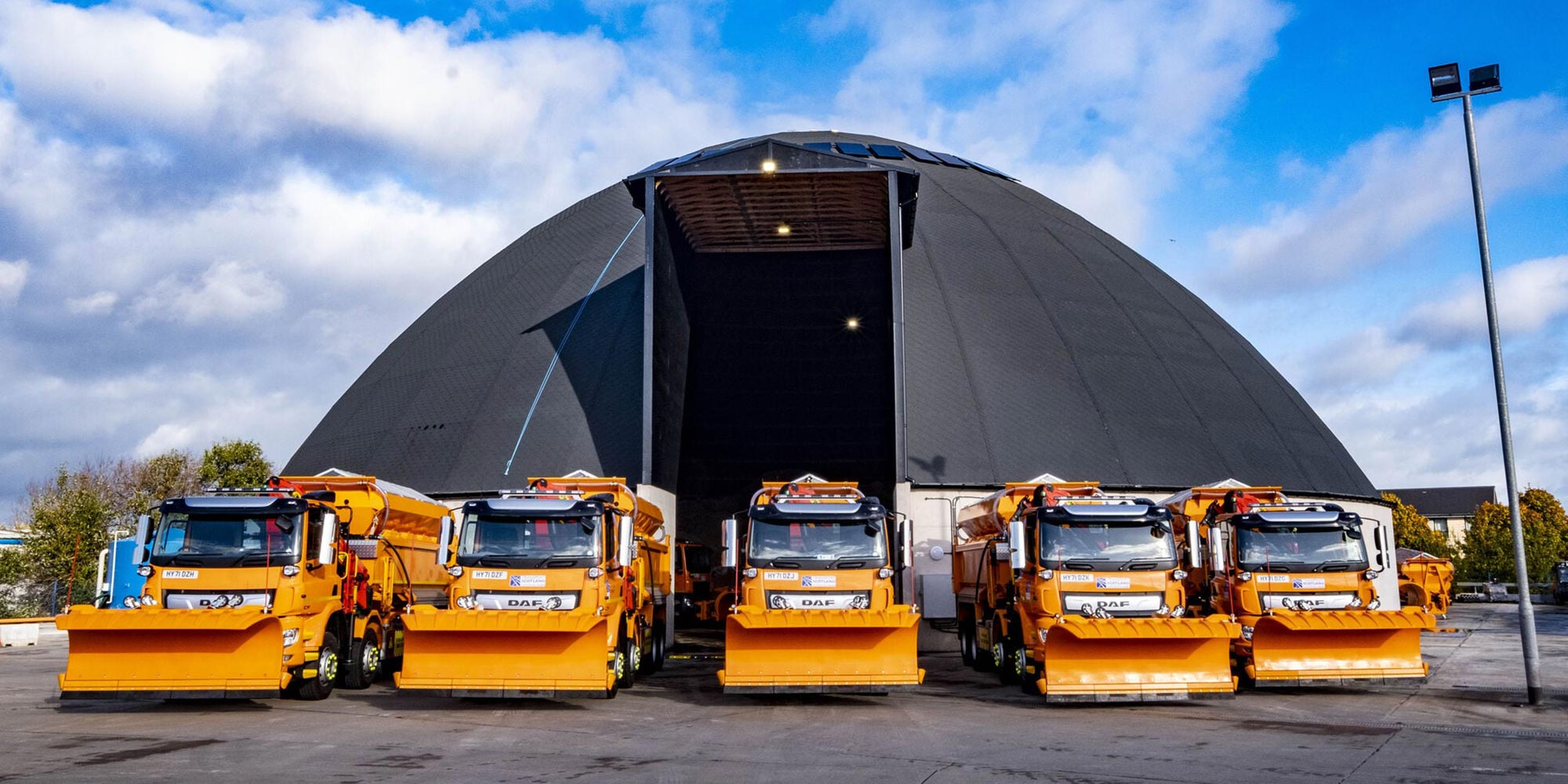Background
When Transport Scotland awarded Scottish Trunk Roads Maintenance Contracts to Amey Highways (Southwest Unit) in the summer of 2020, it sparked a major mobilisation project to prepare for one of the coldest winters in recent times, not only ensuring the roads remained gritted, but that salt stocks remained protected.
Polmadie Depot is one of the largest depots in Scotland, with the greatest concentration of spreaders and routes serving the motorways, carriage ways and critical A class roads in and around Scotland’s biggest city, Glasgow.
Problem
To improve salt stock resilience at the Polmadie Depot in Glasgow and deliver increased economic returns on their investment to the taxpayer, Amey Highways wanted to build resilience into their winter maintenance strategy.
Additionally, as the mobilisation of the contract was planned for September 2020, there was a big challenge to ensure the contract had the correct number of gritters and vehicle sizes with the correct communication packages fitted to allow for a clean transition from the previous outgoing contractor.
Solution
A collaboration between three of the A New Winter Approach members – Econ, Eurodome and Peacock Salt – supplied some of the critical plant and infrastructure to support the mobilisation, resulting in financial savings and sustainability benefits for Amey Highways.
Maximising the use of pre-wet salt
To ensure the depot could meet the demands of a harsh winter, pre-wet salt would be used. Pre-wet salt (applied at FS30) substitutes part of the rock salt application with sodium chloride brine. By doing so, it offers an improvement in treatments and savings when compared to dry salting alone. As pre-wet salt de-ices quicker than dry salt, it offers greater spreading accuracy and there is less loss from fines meaning spread rates can be decreased in certain conditions.
To enable Amey Highways to access large volumes of brine on site, Peacock Salt installed an automated brine saturator which saturates salt into water. The system is capable of producing up to 65,000 litres of brine on demand.
Implementing the system has reduced the amount of rock salt used by Amey Highways by 30% when compared to dry salting.
Peacock Salt also provided white marine salt to produce the brine and de-icing liquid pumping stations to help combat more severe weather conditions.
Sustainable salt storage
To ensure the safe storage of their salt throughout the winter, Transport Scotland opted for a sustainable salt dome designed and built by Eurodome. At 44m in diameter, it is the largest dome in Scotland of this type and can comfortably hold up to 17,000 tonnes of salt. One of the main benefits of a dome is the utilisation of non-corrosive materials, most notably the timber to produce a ‘cathedral-like’ roof construction.
The perfect mix of form and function, the round shape of the dome is one of the strongest in engineering. The shape of the structure uses the least amount of material needed to cover a salt pile the size of Transport Scotland’s, with an estimated saving of 10-15% of the materials used versus that of a rectangular structure. The beauty of the shape means the 21m point does not obscure the view and allows the dome to blend in with its surroundings.
Eurodome worked with Transport Scotland and Amey Highways during the design phase of the dome to drive efficiencies for the traffic flow on site by situating the entrance around the existing infrastructure and roadways, enabling trucks to drive past and pick up salt without having to excessively manoeuvre.
The Importance of Covering Salt
Holding sufficient salt stocks is fundamental to a successful winter on the UK’s roads. A key part of maintaining salt is by ensuring it is adequately covered.
Covering salt prevents salt from becoming wet and leaching away (which can waste between 8-12% of supplies per year). Dry salt also performs better when distributed via a gritting vehicle and prevents gritting vehicles from clogging.
State-of-the-art gritting vehicles
Econ supplied a total of 56 gritting vehicles, over seven diverse variants, including two types of demountable spreaders.
With only four months to pull the fleet together, a complete supply of new equipment was not going to be possible. Amey Highways already had 36 existing vehicles available which were previously operating on the Scottish South East area, but still had a shortfall of 20 vehicles needed to give full operational cover for the upcoming winter. Econ created a schedule to offer 20 short term hire vehicles to be mobilised for September 2020, with a further 36 vehicles delivered in September 2021.
With 20 short term vehicles in place, the next challenge was to ensure the vehicles were fitted with tracking detail, vehicle mounted live camera systems, Vaisala surface temperature and surface state probes and vehicle livery. Working closely with ACP, Vaisala and RaCam, Econ co-ordinated the short-term fitments to the temporary fleet, ensuring a smooth transition for the September 2020 start.
During the 2020-21 season, all the 20 short term vehicles were replaced with new equipment, with all the tracking, temperature probes and camera systems being transferred in contract with no vehicle down time, giving Amey and Transport Scotland peace of mind their winter service was covered all the time.
Carbon footprint reduction
With their environmental footprint in mind, the construction of the salt dome was kept as lightweight as possible – with the lowest amount of materials used to cover the salt pile. The timber was sourced from sustainable forests in Europe. All of the buildings components used can be recycled and reused after the dome reaches the end of its 30+ year lifespan.
With the goal of turning the salt dome carbon neutral, Transport Scotland installed solar panels on the roof which generate energy throughout the summer and supply year-round electricity to power the fans and lights inside the dome.
A 30,000 litre rainwater harvesting tank is connected to the dome guttering, reducing the usage of freshwater by catching rainwater and feeding it into the brine saturator. With Glasgow experiencing some of the highest rainfalls in the UK, it gets plenty of use! However fresh water can also be used to top up the rainwater if supplies run low in the 65,000 litre storage tank.
“The Polmadie Depot is now one of the best equipped depots in the country. The work from each company has been critical to help deliver our Winter Service Plans and ensure resilience in our resources. The additional efforts to reduce carbon footprint has been great and hope these can help us improve sustainability in the future.”
Nick Russell, Severe Weather Manager, Amey Highways
Case study download
You can download a PDF of this case study by clicking this link: ANWA-Scotland-case-study

